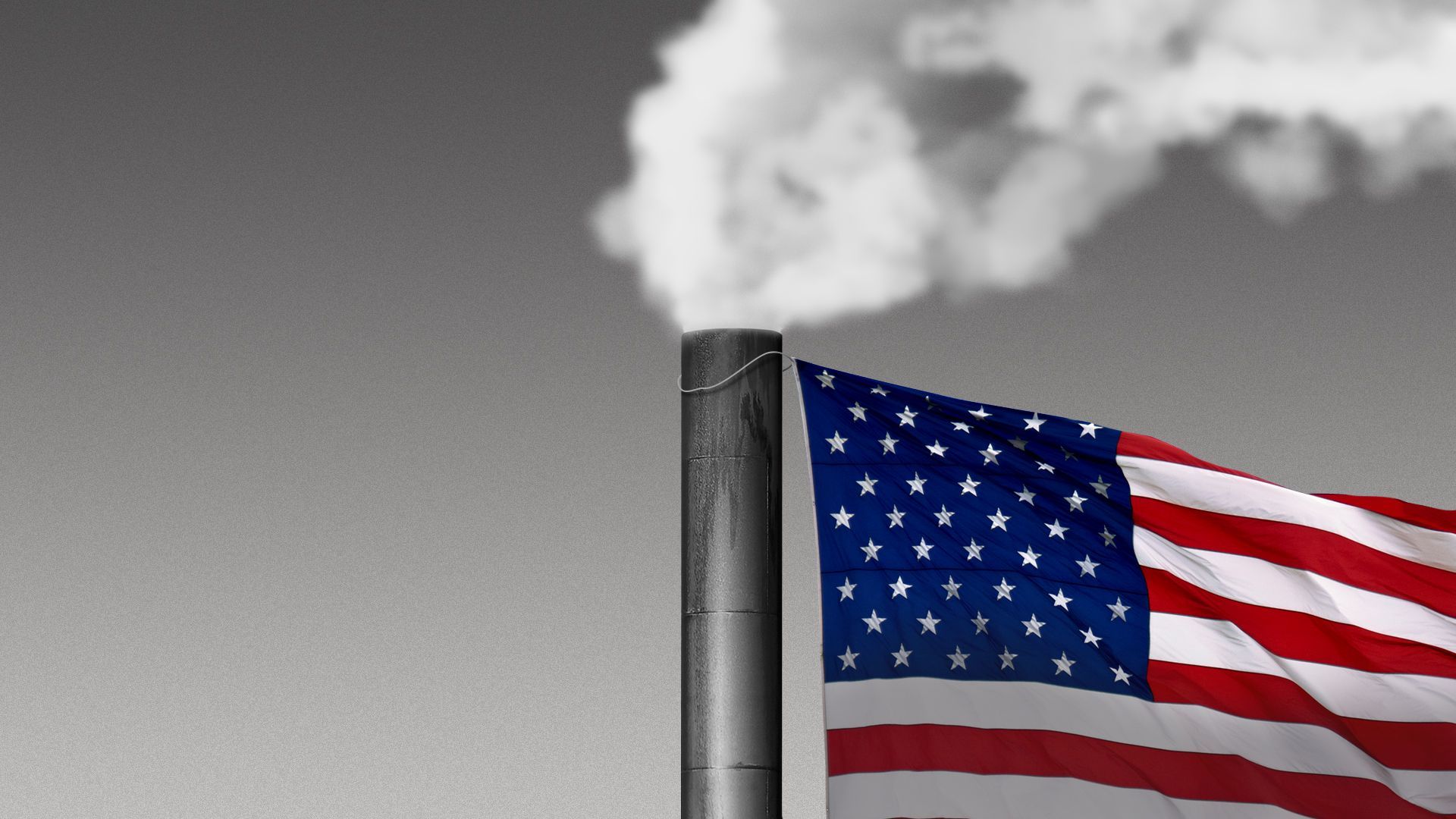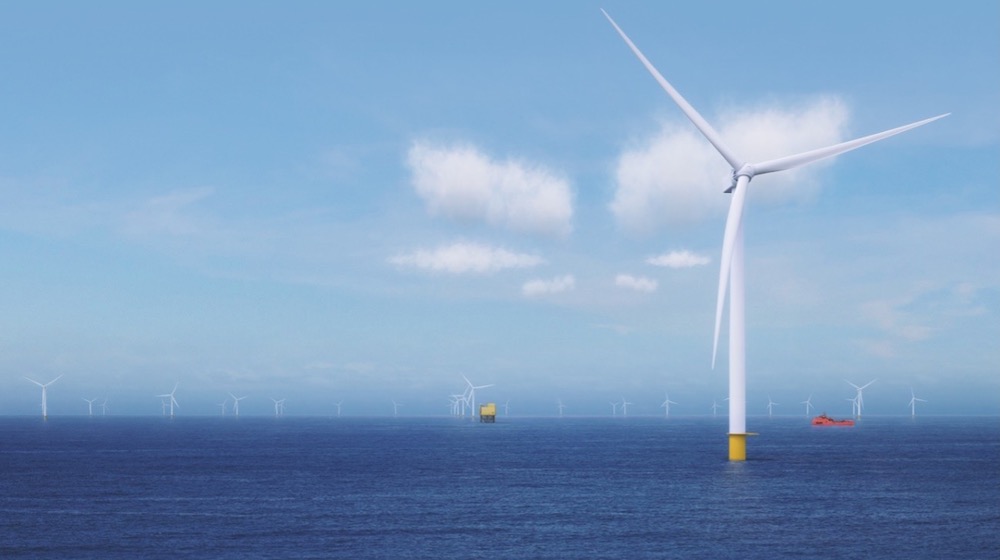| | | | | | | Presented By Equinor | | | | Axios Generate | | By Ben Geman and Andrew Freedman · Jul 01, 2022 | | It's Friday! Andrew here: Today's newsletter is a Supreme Court EPA decision takeover edition. Edited by Mickey Meece, it has a Smart Brevity count of 1,179 words, 4.5 minutes. Thanks for reading during my solo stint, Ben will be back next week. 🎶 My 7-year-old son has switched from Sirius XM's "Hits 1" to its "80s on 8" station, which led to a discussion about the lyrics in today's intro tune... | | | | | | 1 big thing: SCOTUS puts climate targets further out of reach |  | | | Illustration: Brendan Lynch/Axios | | | | The Supreme Court's decision in West Virginia v. EPA yesterday has made it harder for the U.S. to meet its 2030 climate targets, and therefore, more difficult for the world to curtail the severity of human-caused global warming. Why it matters: In striking down the EPA's authority to broadly regulate greenhouse gas emissions from the power sector, the ruling took away a powerful weapon from the Biden administration's anti-emissions arsenal. Catch up quick: The 6-3 ruling along ideological lines leaves EPA with the ability to regulate greenhouse gas emissions, but in a narrower manner than an Obama-era plan to transform the power industry. Zoom in: Climate action may now shift to coordinated state and local actions, federal moves that don't run afoul of the conservative court, and a divided Congress. - "It's a serious constraint on EPA, and its ability to regulate emissions from the power sector," Harvard Law professor and former Obama climate adviser Jody Freeman said in an interview.
The big picture: The U.S. has pledged to reduce its emissions by 50% to 52% below 2005 levels by 2030, shift to a 100% renewable electrical grid by 2035 and reach net-zero emissions by 2050. - None of those goals look achievable absent major congressional legislation or a slew of other highly coordinated steps, according to recent research from the Rhodium Group and other organizations.
- "Our analysis shows that the 2030 target is achievable through accelerated, joint action via Congress, federal regulations, and state-level policy. But without swift progress on all fronts, the 2030 target is in jeopardy," John Larsen, a partner with the Rhodium Group, told Axios via email.
The intrigue: There is an international dimension to this ruling, too. - President Biden has worked to assert U.S. leadership on this issue.
- During and since the Glasgow Climate Summit, Biden and other leaders have called for countries to commit to more stringent 2030 emissions targets. Failing to meet its own, however, would erode U.S. credibility.
What they're saying: "This is a setback in our fight against climate change, when we are already far off-track in meeting the goals of the Paris Agreement," said Stéphane Dujarric, spokesperson for UN Secretary-General António Guterres, in a statement. The bottom line: The ruling gives greenhouse gases the upper hand, and the world is headed for warming to sail past the Paris targets, with consequences ranging from deadly extreme weather events to sea level rise. Go deeper: Climate body blow |     | | | | | | 2. What the ruling says |  | | | Illustration: Sarah Grillo/Axios | | | | The court's conservative majority held that Congress, through the Clean Air Act, did not intend to give the EPA the authority to impose sweeping regulations on the power sector to lower greenhouse gas emissions. The big picture: In the majority opinion, Chief Justice John Roberts rests the decision on the "major questions doctrine," and the term shows up more than two dozen times in the majority and concurring opinions. - This viewpoint holds that Congress must explicitly grant an agency the authority to regulate issues that have "vast economic and political significance," the decision states.
- The court held that transforming the nation's power mix using a national cap- and trade-like system, put forward during the Obama administration and known as the Clean Power Plan, falls under this rubric. (That plan was never actually implemented, however.)
Yes, but: The court's liberal wing, in a dissent written by Justice Elana Kagan, criticized the majority for substituting its own interpretation on a high-stakes, scientific issue. - "Whatever else this Court may know about, it does not have a clue about how to address climate change," Kagan wrote. "The Court appoints itself—instead of Congress or the expert agency—the decisionmaker on climate policy. I cannot think of many things more frightening."
What's next: The EPA still retains the authority under the Clean Air Act to regulate greenhouse gas emissions. It just cannot do so in the specific way the court struck down. - But you can bet future EPA climate regulations will be challenged in court.
Read the full decision and dissent. |     | | | | | | 3. The EPA case is just the beginning |  | | | Illustration: Annelise Capossela/Axios | | | | The EPA ruling is part of an opening salvo in what is likely to be a protracted battle to rein in federal regulations. Why it matters: By rooting its decision in the major questions doctrine, the court signaled its receptiveness to future cases in which plaintiffs can argue that federal agencies overstepped their authority. - "It has the potential to put agencies on the defensive for every decision that anybody can say is major," Harvard Law's Jody Freeman told Axios. "It will open up a flurry of litigation, challenging agency decisions across the board, as beyond their authority."
Between the lines: One near-term target could be the SEC's drive to issue climate risk disclosure requirements. - For example, in its comments on the SEC's proposal, Shell stated that its lawyers see a potential "issue" with the rule that is related to the major questions doctrine.
Of note: Jonathan Adler, a professor at Case Western Reserve University School of Law, said the fate of the SEC's proposed rules depends on how they're written. The SEC would be on shaky ground if it were to take actions out of step with what it's historically done, he adds. - In other words, if the agency bases the disclosure rules on things like risks to companies' value and performance, then that could pass muster with the current court.
- But if it uses disclosure requirements to push emissions reduction — which some parties may allege — then the court may view that as something Congress didn't authorize.
|     | | | | | | A message from Equinor | | How Equinor is becoming a leader in America's offshore wind industry | | |  | | | | Equinor will power about 2 million homes in New York with renewable energy — boosting the economy, generating jobs and building new wind energy infrastructure. We're committed to becoming net-zero by 2050 by advancing the development of the Empire Wind and Beacon Wind offshore wind projects. | | | | | | 4. White House absorbs the setback |  | | | Photo illustration: Aïda Amer/Axios. Photo: Stefani Reynolds/Getty Images | | | | A source familiar with White House thinking says the administration takes solace in the fact that the EPA retains the ability to address greenhouse gases, albeit in narrower ways, and that it has many other avenues to lower emissions. Why it matters: The White House is characterizing the ruling as a significant setback for its climate agenda, particularly when it comes to meeting the benchmarks it has laid out. - Yet despite the fact that the court telegraphed its ruling during oral arguments in February, the White House did not announce a clear plan of action in the near term to take the offensive on climate, which is a key issue for its base heading into the midterm elections.
- It also is keenly aware of the signaling coming from the court that sets up future battles to come.
What they're saying: In a statement yesterday, Biden vowed his administration "will continue using lawful executive authority, including the EPA's legally-upheld authorities, to keep our air clean, protect public health, and tackle the climate crisis." - Biden also said his administration will work with states and cities to pass their own climate initiatives and will push for new legislation from Congress.
|     | | | | | | 5. Catch up fast: SCOTUS perspectives to read | | ⏰ The NYT puts the ruling in the context of a concerted effort to curtail the administrative state. 🌆 Cities and states take on new importance in fighting climate change, Bloomberg, NYT and others point out. 🇺🇳 Reuters looks at the ruling through the lens of the United Nations. |     | | | | | | A message from Equinor | | The energy transition is the defining opportunity of our time | | |  | | | | Equinor is accelerating the energy transition by growing our renewable energy portfolio and cutting greenhouse gas emissions. Through the Empire Wind and Beacon Wind offshore wind developments, we will power about 2 million homes in New York with renewable energy. | | | | Thanks for reading, and have a relaxing, safe and healthy holiday weekend! See you Tuesday morning. |  | It's called Smart Brevity®. Over 300 orgs use it — in a tool called Axios HQ — to drive productivity with clearer workplace communications. | | | | | | Axios thanks our partners for supporting our newsletters. If you're interested in advertising, learn more here.
Sponsorship has no influence on editorial content. Axios, 3100 Clarendon Blvd, Suite 1300, Arlington VA 22201 | | | You received this email because you signed up for newsletters from Axios.
Change your preferences or unsubscribe here. | | | Was this email forwarded to you?
Sign up now to get Axios in your inbox. | | | | Follow Axios on social media:    | | | | | |








No comments:
Post a Comment